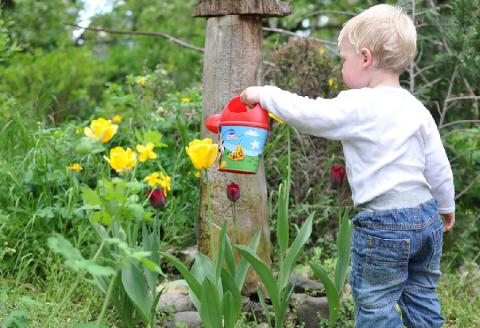Growing Simple Mini Gardens for Kids

Think about what you want to grow. Do you want a few flowers that will give you beautiful colors throughout the summer or do you want some vegetables to make a tasty salad some time later this summer or even try to grow some beautiful squash or a pumpkin? Once you decide what you want to grow, you need to choose what kind of garden your plants will need. All plants have a few basic needs to grow including; a space to grow with rich soil, water, nutrients and lots of sunlight. Let’s take a look at each of these.
- Space or a Container – The size and number of your full-grown plants will determine the size of your garden. Large plants like pumpkins, squash or ornamental gourds need a lot of space and should be planted in the ground with room for their leaves and vines to spread. But, small to medium size plants can grow in almost any container. Medium to large size pots and planters can be used to grow any number of flowers and vegetables. Pinterest and the Google are great ideas for different containers. Shoes and old bathtubs can even be used as container gardens.
- Soil, and nutrients – Once you’ve decided what to plant and where you want to plant it, head down to your local garden center and get some good potting soil and fertilizer. The staff there can help you choose what is best for the kind of plants you want to grow. Bring it all home, fill your containers and plant the seeds as recommended on the package.
- Water and Light – Then find a place where it will get plenty of sun and it can be watered daily without worrying about making a mess. Check the plants daily to make sure they don’t dry out.
With some patience and regular attention small plants will begin to grow. In most cases it will take several weeks to a few months to see the rewards for hard work. Some flowers will come out after several weeks, while vegetables like radishes and lettuce will be ready to eat in 30-50 days, most veggies take 60 – 80 days until they’re ready to harvest.
Your garden should grow through the summer and into the fall. One fun way to celebrate your garden is to enter some of your veggies in a local fair to see how they measure up to others. Country fairs have a rich tradition of farmers and gardeners entering prize tomatoes or squash and it’s always fun to see the variety and colors of the year’s harvest. Even the smallest gardens have something to share at the fair.
Note: Due to Covid-19, 2020 NH County Fairs have been cancelled.
For more information on entering vegetables in the fair go to the Sandwich Fair website www.thesandwichfair.com and search for veggies under the exhibits heading and for more information on growing vegetables and container gardens go to the fruits and vegetables page of the UNH Cooperative Extension www.extension.unh.edu/Fruits-and-Vegetables.
New Hampshire 4-H has many opportunities for youth and families to learn about and experience gardening.
